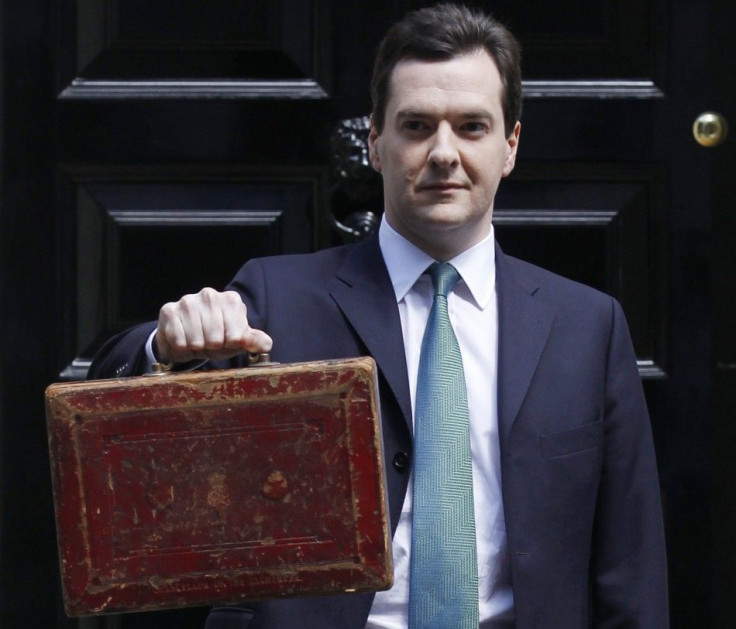Budget 2012: George Osborne Hopes March Data Signals Green Shoots for UK Economy

UK Chancellor George Osborne with the traditional Gladstone Box of budget papers (Reuters)
UK Chancellor George Osborne can step up to the despatch box in Parliament on 21 March to deliver his third Budget statement with just a bit more confidence following a solid stretch of economic data that might signal Europe's second-largest economy is finally emerging from its slumber.
In what could be a defining week for the Chancellor's ambitious plans to balance the nation's books by 2017, Osborne will at least have some hard numbers to back-up his rhetoric: inflation is slowing, industrial activity is improving and maybe, just maybe, the economic growth is beginning to improve.
Data from the Office of National Statistics signalled some much-needed relief for squeezed consumers as a dip in home energy prices eased February's inflation rate to a 13-month low. Shortly after, the Confederation of British Industry said it expects manufacturing activity to increase at the quickest pace in more than a year over the next three months, despite a slight dip in new orders for the month of March.
Meanwhile, the Financial Times has reported the UK's Treasury watchdog, the non-partisan Office of Budget Responsibility (OBR), is set to increase its economic growth forecasts for the coming year - however marginally - and may indicate the threat of a double-dip recession has subsided.
It is all excellent ammunition for an under-fire Chancellor trying to keep his sights set on a series of fiscal challenges, including an elimination of the underlying structural deficit by 2017, lowering a stubbornly high unemployment rate and keeping the number crunchers at Fitch and Moody's from stripping away the nation's coveted triple-A debt rating.
What's in the Red Box?
But is it enough?
If the Chancellor can avoid a return to recession this year - thanks to a pause in the eurozone debt crisis and some (very) cautious investor optimism - he might just be able cement his case for the steepest austerity drive since the Second World War. He may also silence his political opponents who have argued his deficit reduction plans have cut too far and too fast, sacrificing growth - and employment - to satisfy the fleeting demands of the bond market.
Traders will certainly be waiting to hear details of the government's 2012 borrowing requirements. Economists expect the chancellor to ask his colleagues at the Debt Management Agency to raise around £115bn in the next fiscal year (beginning on 1 April) and £100bn in the following year. Assuming - and it's a big, big assumption - the OBR's GDP growth targets are accurate, the figures suggest the chancellor's aim of deficit and debt reduction are safely on track. He might even feel confident enough to toss in approval for a rare 100-year gilt sale that would lock in the historically low market interest rates currently on offer.
However, it is the domestic portion of the Budget statement that may provide the chancellor's critics more room for attack. Osborne plans to controversially lower the upper rate of income tax to 40 percent from 50 percent for the nation's top earners (defined as those on salaries of £150,000 or more), a move that's sure to be savaged by shadow chancellor Ed Balls and, indeed, has already made Osborne's collation partner, Liberal Democrat leader Nick Clegg, uneasy. Whether this scepticism can be won over with nods to the Lib Dem's preference for so-called mansion or tycoon taxes remains to be seen.
Events, Dear Boy, Events
From a market perspective, however, the Budget statement is likely to have very little impact on either sterling or gilt prices. The framework for growth is largely in place and, aside from some domestic tinkering, the real changes will come from events and policies that are well beyond the chancellor's control: high oil prices, China's ability to safely manage a soft economic landing and the resolution of political tensions in Iran and Syria.
A clear steer through that triangle of event risk will validate Osborne's austerity-led approach to economic recovery. But any bumps on that winding road will most likely compel the chancellor to soften his debt-reduction pledges and rethink a strategy that relies on stimulus.
But that is a worry for another day. Osborne first has to face the opposition front bench - and a reluctant ally.
And after a week that has unfolded as well as it possibly could for the nation's finance minister, he is probably feeling pretty good about it.
© Copyright IBTimes 2025. All rights reserved.




















